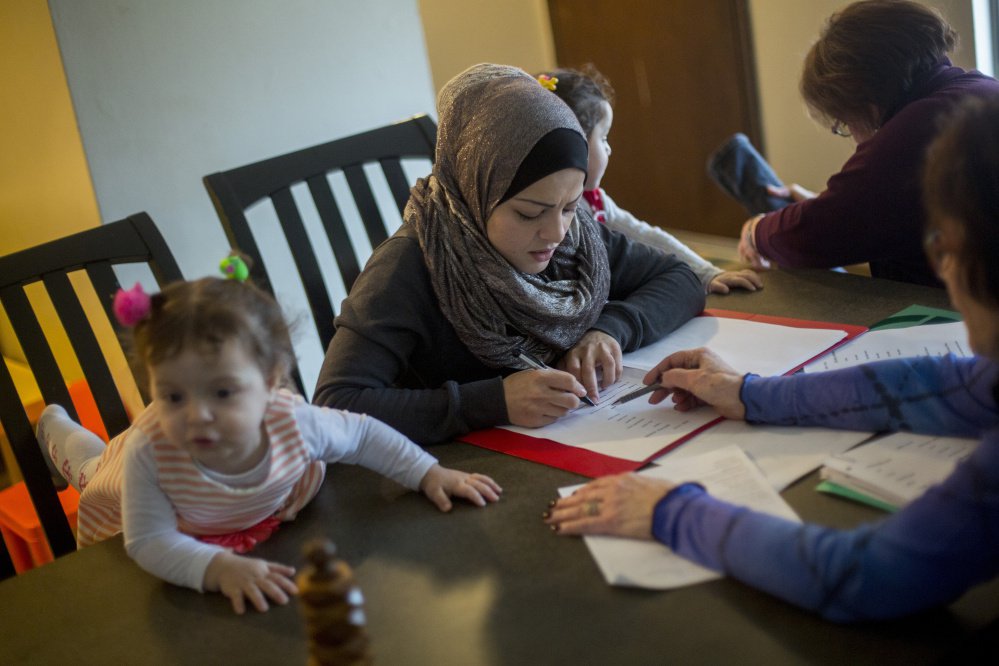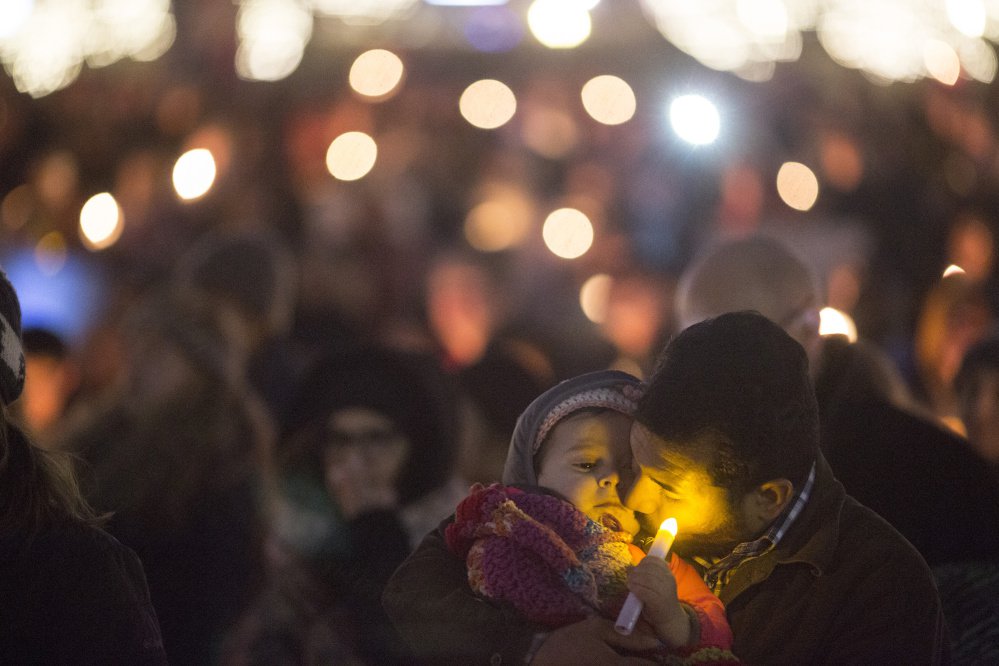OMAHA, Neb. — The rice and chicken were steaming on the stove. The twins chased each other around the apartment and the 2-year-old watched Mickey Mouse on the donated television.
Their mother, Fatema Aljasem, 29, sat at the kitchen table with two women from the local synagogue. Since the Syrian was granted asylum in September, the women had been helping her learn English. She pulled at her hijab and pointed at the words, mouthing ways of conjugating the verb “to go.”
“Shadi goes to school.” “Ahmed goes to work.”
The one that seemed especially challenging these days, though, was the verb “to be.” How to be calm in the daily chaos of motherhood. How to be comfortable in this new place where the president had just banned refugees like her. How to be an American.
Here in deeply conservative Nebraska, President Trump’s executive order banning refugees and people from several majority-Muslim nations was generally welcomed – but not entirely so in a state that has taken in more refugees per capita than any other in the nation.
During the presidential campaign, Sen. Ben Sasse, R-Neb., became a prime critic of Trump in large part because of his plan to ban Muslims from entering the United States. When Trump signed the executive order, Sasse criticized it as “too broad.”
Gov. Pete Ricketts, a Republican who has supported a ban on Syrians from the moment Trump first pitched it, has also talked about welcoming refugees already here as a source of statewide pride.
Aljasem, who moved with her husband, Ahmed, 30, and their five children, said she felt grateful to arrive before Trump’s ban. She felt guilt for those who hadn’t.
“I tried to call my parents and I didn’t hear from them,” said Aljasem, whose wide eyes began to water when she spoke. “I don’t know where they are. They could be dead.”
She did get in contact with her sister, who was living in a refugee camp in Jordan. They shared dreams of reuniting, but now her sister wanted to know: Is the United States a good place to be?
Aljasem remembered pausing at the question. Then she told her sister about how the children have been making friends at school. She said she never saw anyone sneer at her headscarf or look at her in a “racist way.” She had Jewish friends who helped drive her family to doctor’s appointments and who were teaching her English. Her husband quickly found a job at a shampoo factory.
“The country is good,” she recalled telling her. “It’s really good. It’s still good.”
After she hung up, though, she confessed that she was worried about whether it would stay that way.
“Now I am concerned about how they will treat me if they agree with the president, if they will treat me in a racist way,” she said. “I worry this ban will change how I feel inside, that it will cause me to worry more for me and my kids. We did not come here to cause trouble. We just want to live.”
ISOLATED BIAS INCIDENTS
During the past two years, more than half of the 1,531 refugees resettled by Lutheran Family Services of Nebraska left the nations affected by the ban. More than 60 families – 164 men, women and children – came from Syria.
Nebraska has long been a draw for refugees. Unemployment is low, rent is affordable and manufacturing and service jobs are plentiful, according to Lacey Studnicka, a program development officer at Lutheran Family Services.
Not that Omaha has been immune to the uptick in bias incidents seen across the country, according to reports from the Southern Poverty Law Center. Someone recently left raw bacon – those who practice Islam do not consume pork products – on the front door of a mosque, according to local news reports. It was the fourth time since August that the mosque had been targeted.
Studnicka sees those incidents as isolated. “For every negative phone call we get, we get 10 nice ones,” she said.
A few blocks away from Aljasem, John Dutcher, a 61-year-old house cleaner, lives in a complex of low-rise apartments in a neighborhood where American flags flapped on porches. After the Sept. 11 terrorist attacks, Dutcher said he was “one of those guys who would want to put a pig’s head on a mosque. I never acted on it, but I played it in my head.”
“I hated Muslims,” he said.
For years, Dutcher’s neighbors were meth addicts and rowdy alcoholics. Slobs. In June, a Syrian family who spoke no English moved in. Another family moved in after that, then another. Now there are six.
Soon enough, Dutcher said, empty bottles in the hallway were replaced with children’s bicycles. The loud arguments of a drug-addicted couple were replaced with the sounds of kids’ laughter.
“The Muslims here were all about family and they just loved everyone,” Dutcher said. “I remember the people who lived here before, they took for granted everything this country gave them. These people, they really changed my heart.”
Through translators, he learned about the families’ stories of loss and fleeing war. It softened his stance on Islam and led him to question some of what Trump was saying.
Dutcher said he continues to support Trump’s views on strong borders and curbing illegal immigration, but said his experience taught him that “refugees were a different thing entirely.”
“I like him, but I don’t like the way he’s carried out this ban,” Dutcher said. “I didn’t think he’d make a blunder so fast.”
OFFERS OF HELP INCREASE
Since the entry ban, Studnicka said refugee advocacy organizations are seeing a surge in interest. Typically her organization gets five calls a week about volunteering. In the first five days after Trump’s order, it received 120.
Calls came from congregations such as Beth El Synagogue, whose members were helping the Aljasems get accustomed to their new country, and individuals such as John Detisch and Hillary Nather-Detisch, who were so moved by the crisis in Syria that they resolved to do what they could.
The couple agreed to sponsor the sister of Diaa Sarsaf, 32, who was originally from Damascus. Sarsaf said it took about 20 months for authorities to complete background checks and grant him asylum.
His sister, whose name is being withheld for her protection, was supposed to arrive last week.
The Detisch family bought her furniture, plus 40 pounds of rice and 20 pounds of flour to help stock her kitchen. Then Trump’s order came. Then a court ruling that the order shouldn’t be enforced. Now, no one is sure whether Sarsaf’s sister will reach the United States.
“I am so sorry that you had to go through this,” Sarsaf said through a translator as he sat at their dinner table.
Nather-Detisch’s eyes reddened when she heard his apology. Here was Sarsaf trying to reassure them – and himself – that things would be okay because he heard that the Trump administration might build a “safe zone” in Syria.
“At least she will be able to go there, she will be safe,” Sarsaf said. “We just want safety. I don’t have any choice than to trust the president.”
ESCAPING ALEPPO
The next night, the Aljasems climbed out of a car in a parking lot downtown. Five-year-old Fadi ran into the arms of a man he recognized from the synagogue.
Fatema Aljasem could hardly believe her good fortune. She had never before known anyone Jewish, and these Jews were so friendly that her kids would laugh and play with them and hold hands as they walked to a park.
The Syrian city of Aleppo had been so dangerous that she delivered her twins in her own home, too afraid to go to the hospital. Two months later, she wrapped them tight and carried them on her shoulders as she walked through the desert at night to reach a Jordanian refugee camp. There were no bombs there, but there were no teachers for her children, either. Now her kids learn the alphabet at school, and she had an English teacher herself.
For so long she had been running away. Now, she was stepping out.
More than 1,000 people had gathered in Turner Park. They shivered and clutched candles close to their chests.
Ruth Henrichs, the chief executive of Lutheran Family Services, would later say that she didn’t want the night to be a protest but a vigil. She gathered members of the clergy, people of all faiths, to envision a more compassionate country.
“It might seem that there’s darkness in our nation,” a speaker on the stage said, “But look around. We have hope! We have light.”
A man with an acoustic guitar took to the stage and asked the audience to sing along.
“This land is my land, this land is your land … this land was made for you and me.”
The chorus began to swell. Aljasem looked at her husband and smiled, and together they tried to sing along.
Send questions/comments to the editors.




Success. Please wait for the page to reload. If the page does not reload within 5 seconds, please refresh the page.
Enter your email and password to access comments.
Hi, to comment on stories you must . This profile is in addition to your subscription and website login.
Already have a commenting profile? .
Invalid username/password.
Please check your email to confirm and complete your registration.
Only subscribers are eligible to post comments. Please subscribe or login first for digital access. Here’s why.
Use the form below to reset your password. When you've submitted your account email, we will send an email with a reset code.